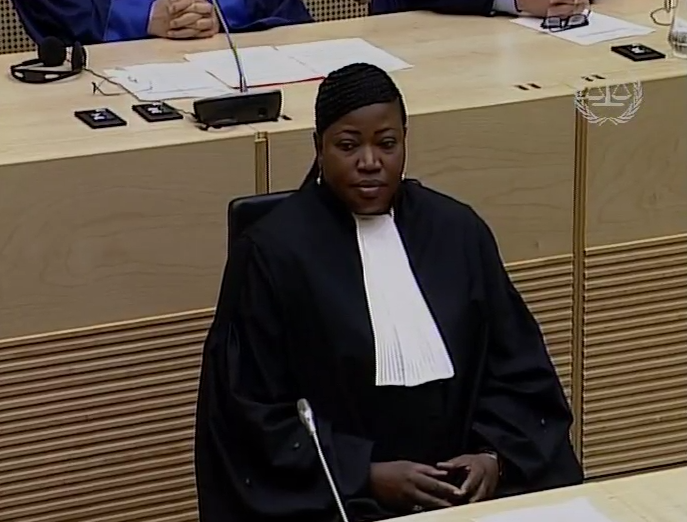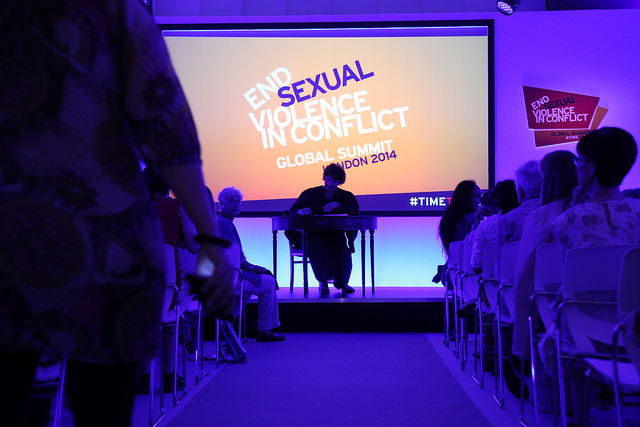
Credit: ICC
The Prosecutor of the International Criminal Court (ICC), Ms. Fatou Bensouda, has published a Policy Paper on Sexual and Gender-Based Crimes describing the approach her office will take with regard to such crimes going forward. The Policy Paper, released on June 5th of this year, is the latest indicator that the Office of the Prosecutor plans to emphasize sexual and gender-based crimes in its preliminary examinations, investigations, and prosecutions of international crimes.
“The message to perpetrators and would-be perpetrators must be clear: sexual violence and gender-based crimes in conflict will neither be tolerated nor ignored at the ICC,” Bensouda said upon the release of the paper. [ICC Press Release: Policy Paper] According to the Policy Paper, the Prosecutor’s general policy will be to “pay particular attention to the commission of sexual and gender-based crimes,” and to “enhance the integration of a gender perspective and analysis at all stages of its work.” See ICC Office of the Prosecutor, Policy Paper on Sexual and Gender-Based Crimes 12 (June 2014).
Global Summit to End Sexual Violence in Conflict
The release of the Policy Paper coincides with the June 10-13 Global Summit to End Sexual Violence in Conflict (the Summit), the largest “global meeting” ever convened to address the issue of sexual violence in conflict. The Summit will be the setting for the launch of a new international protocol that sets standards for the investigation and documentation of sexual violence in conflict zones. [OHCHR]
The Summit is being hosted in London by British Foreign Secretary William Hague and Special Envoy to the U.N. High Commission for Refugees Angelina Jolie, and attendees include the U.S. Secretary of State John Kerry and 900 additional experts, NGOs, and survivors, among others. ICC President Judge Sang-Hyun Song, Prosecutor Fatou Bensouda, and other high level officials from the ICC will also be in attendance. [ICC Press Release: Summit]
Access the live blog and webcast of Summit events here.

Credit: Foreign & Commonwealth Office
Policy Paper on Sexual and Gender-Based Crimes
Serving primarily as a “foundation” for dealing effectively with “the scourge of sexual and gender-based crimes,” the Policy Paper is intended to promote transparency, clarity, and predictability at the ICC. [ICC Press Release: Policy Paper] Due to the “specific challenges” of investigating sexual and gender-based crimes, such as the stigmatization of victims, evidentiary deficiencies, and under- or non-reporting of such crimes, the application of a gender perspective and analysis to all crimes falling within its jurisdiction will aid the Office of the Prosecutor in examining the relationship between sexual and gender-based crimes and the inequalities between men and women. Policy Paper, 5-6. The process of integrating a gender perspective and analysis will require “being innovative in the investigation and prosecution of these crimes, training staff adequately, and giving special attention to the manner in which staff interact with victims.” Id. at 21.
The term “gender perspective” refers to the recognition of differences between men and women in terms of “status, power, roles, and needs,” as well as how gender impacts people’s “opportunities and interactions.” Id. at 3. “Gender analysis” is the examination of “the underlying differences and inequalities” between men and women, power relationships between them, and other dynamics that shape people’s gender roles in a given society. Id. at 4. Incorporating both approaches into its work is intended to permit the Office of the Prosecutor to better understand the crimes it investigates and prosecutes and how they relate to gender norms and inequalities. Id. at 4.
As identified in the Policy Paper, the main objectives of the Office of the Prosecutor will be to:
- affirm the Office’s commitment to paying special attention to sexual and gender-based crimes, within the limits of the Rome Statute of the ICC;
- help implement and utilize the provisions of the Statute and Rules of the Court so that investigations and prosecutions of sexual and gender-based crimes are effective;
- elucidate and give direction on issues that relate to sexual or gender-based crimes in any aspect of the Office’s operations;
- serve as an example of best practice in the investigation and prosecution of sexual and gender-based crimes; and,
- contribute to the development of international jurisprudence regarding sexual and gender-based crimes.
Policy Paper, 10-11.
In order to achieve these objectives, the Office of the Prosecutor will:
- apply and interpret the Statute of the ICC consistently with internationally-recognized human rights, and in particular those that relate to women’s rights and gender equality;
- consider acts related to socially-constructed gender roles in addition to actions of violence and discrimination;
- recognize that various factors, such as “gender, age, race, disability, religion or belief, political or other opinion, national, ethnic, or social origin, birth, sex, sexual orientation, and other status or identities” often intersect to produce multiple layers of discrimination and social inequality;
- avoid gender discrimination in all aspects of the work of the Office and address it if it occurs in the work of other parties or organs of the ICC; and,
- advocate including sexual and gender-based crimes in litigation before the ICC.
Id. at 16.
Sexual and Gender-Based Prosecutions
Although considered to be “amongst the gravest under the Statute,” sexual and gender-based crimes have not been the subject of any ICC conviction. Id. at 5. Civil society groups have urged the Office of the Prosecutor to do more to ensure that defendants are held accountable for such crimes. [Institute for War & Peace Reporting] Understanding the many ways in which acts of sexual violence are used to “diminish gender, ethnic, racial, and other identities” should allow the Office to “take into account the multi-faceted character and the resulting suffering, harm, and impact of such acts.” Policy Paper, 12-13, 24. This consideration will hopefully lead to higher numbers of investigations and convictions for crimes of sexual or gender-based violence.
Skeptics, however, question whether the publication of the Policy Paper will lead to convictions for serious sexual and gender-based crimes. [Institute for War and Peace Reporting;allAfrica] Others have expressed the opposing concern that the Policy Paper “seems intended to place such crimes at the center of the court’s examination of war crimes.” [New York Times] Prosecutor Bensouda, who has taken a firm stance in favor of fighting sexual and gender-based crimes, writes in the Policy Paper that “[a]ccountability for, and the prevention of, sexual and gender-based crimes require unified action, commitment, and dedicated efforts by all relevant actors.” Policy Paper, 11.
The International Criminal Court
The ICC is a permanent, treaty-based international criminal court empowered to exercise jurisdiction over individuals responsible for “the most serious crimes of international concern.” Rome Statute of the ICC (opened for signature July 17, 1998, entered into force July 1, 2002), 2187 U.N.T.S. 3, art. 1. Crimes falling within the jurisdiction of the ICC are genocide, crimes against humanity, war crimes, and aggression. The first of its kind, the ICC is also the first international court whose constitutive instrument, the Rome Statute, expressly lists sexual and gender-based crimes among the catalog of war crimes proscribed under the laws of war and to incorporate sexual violence into its enumeration of crimes against humanity. Policy Paper, 5, 15.
For more information, see the International Criminal Law and International Criminal Court sections of the IJRC Online Resource Hub.
